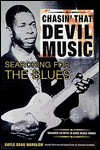 To begin with, the Gayle Dean Wardlow name should a familiar one to most blues enthusiasts. His groundbreaking work in research and documentation is on par, or above, what many others have accomplished. It was Wardlow who found and interviewed Ishmon Bracey, a Delta bluesman from the 1920's and 30's, and one who inspired and influenced many. Mr. Wardlow also took the time to search out H.C. Speir, a businessman and talent scout responsible for bringing Son House, Charley Patton, and many others, to the record buying public. What has become his highest honor is perhaps the discovery of Robert Johnson's death certificate after more than three years of looking. His knowledge on the subject of blues is unassailable, and he has written liner notes for many compilations of Delta and Country Blues artists, and numerous articles for magazines. His first book, Chasin' That Devil Music, is a wonderful contribution, and one that belongs in any blues collection.
To begin with, the Gayle Dean Wardlow name should a familiar one to most blues enthusiasts. His groundbreaking work in research and documentation is on par, or above, what many others have accomplished. It was Wardlow who found and interviewed Ishmon Bracey, a Delta bluesman from the 1920's and 30's, and one who inspired and influenced many. Mr. Wardlow also took the time to search out H.C. Speir, a businessman and talent scout responsible for bringing Son House, Charley Patton, and many others, to the record buying public. What has become his highest honor is perhaps the discovery of Robert Johnson's death certificate after more than three years of looking. His knowledge on the subject of blues is unassailable, and he has written liner notes for many compilations of Delta and Country Blues artists, and numerous articles for magazines. His first book, Chasin' That Devil Music, is a wonderful contribution, and one that belongs in any blues collection.
In the closing sentence of his foreword, Gayle Dean Wardlow invites us to "take a hand-in-hand walk with the men who made this great music," and that is precisely what the book does. Made up of many articles Wardlow has written over the years; some featured in prevalent blues publications, some now seeing the light of day for the first time, and some newly garnered information, the work flows from one subject to another, leaving the reader with an appetite for more. Edited by Edward Komara, Director of the University of Mississippi Blues Archive, the chapters cover the entire terrain of the Mississippi Delta, with Wardlow's initial days knocking on doors to scour attics and trash heaps, hoping to find western swing music 78's. It was while hunting these records that he began buying blues discs, finding the music rewarding and mysterious, which led to the honored position he now has as a world-renowned 'blues investigator.' In the 1960's, New York researchers contacted Wardlow, a resident of Mississippi, asking him to help locate many of the blues artists thought to either still live in the area, or possibly have relatives residing there.
His other chapters, all as interesting as the first, include much on his use of city directories and county records, used to ferret out those all-but-forgotten names on old 78's, lengthy passages on Robert Johnson and the unanswered questions surrounding his short life, Charley Patton's enormous influence on others, and the shrouded-in-haze Willie Brown, a man of incredible power. In addition, he unravels Tommy Johnson through talks with brother Ledell, and discusses the Huff brothers, Garfield Akers and Joe Callicott, Blind Roosevelt Graves, and much more.
It is Mr. Wardlow's hope that he will come to be regarded as a blues writer, and with Chasin' That Devil Music, he succeeds from all directions. While the days of being a blues detective are all but over, Wardlow is planning another book which will surely be as interesting as his first. The added bonus here is a CD, with ample playing time, containing music from his incredible private collection, spiced with snippets of interviews with Bracey, Speir, and Reverend Booker Miller. With as much reading as there is on the subject of blues today, take a step back in time with Gayle Dean Wardlow, and discover the richness of the music, the men, and the Mississippi landscape.
This review is copyright © 2001 by Craig Ruskey, and Blues On Stage, all rights reserved. Copy, duplication or download prohibited without written permission. For permission to use this review please send an E-mail to Ray Stiles.
